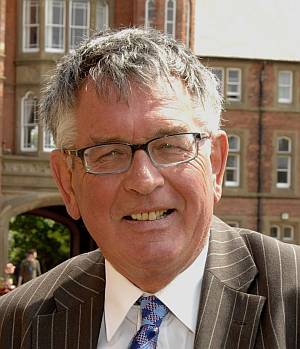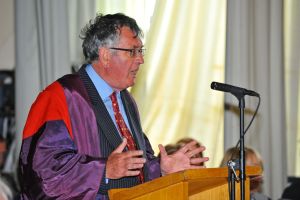One of the UK’s leading educationalists and North West independent school headmaster, Dr Stephen Winkley has  criticized the state of British education and called for the return of Grammar Schools as he prepares to hang up his mortar and gown for the last time following a 45-year career.
criticized the state of British education and called for the return of Grammar Schools as he prepares to hang up his mortar and gown for the last time following a 45-year career.
Dr Winkley, headmaster of Lancashire’s Rossall School and a former Chairman of the Boarding Schools’ Association claims that successive Education Secretaries of both main parties have tinkered with education too much in recent decades and believes that the only losers are the children whose futures are affected by decisions made in Whitehall.
He has also suggested that the current Secretary of State for Education, Michael Gove has not gone far enough with reform of the exam system for senior pupils and accuses him of chickening out of reinstating Grammar Schools because of pressures from within his own party and other members of the coalition government.
Preparing his speech for his final Prize Day ceremony at Rossall, before retiring at the end of term, he suggested that if Mr Gove had really wanted to improve the chances of students from poorer backgrounds then he only had one choice to make and that was the return of the Grammar School system, which had been the pathway to university for generations of bright children from less affluent backgrounds.
Commented Dr Winkley: “If I had one observation to make about Britain’s education over the last forty years, it’s that it has become a culture obsessed with measurement and, that, rather than the needs of children, has dictated education policy.
“Our country has slipped in global education rankings, being overtaken by Asian powerhouse economies of South  Korea, China and Singapore. In our own neck of the woods, Finland has performed extremely well in recent years.
Korea, China and Singapore. In our own neck of the woods, Finland has performed extremely well in recent years.
In some tables it is shown as the top country in the world for education standards (literacy and numeracy), yet only two decades ago their standards were poor.
It shows that things can change given the right leadership and the will to improve and it begs the question: why can we not emulate their success?
“It’s true that British independent schools are still viewed as the best in the world, which is why so many people from countries such as China and South Korea choose to send their children here to gain a British education but apart from Independent schools and the small number of academies and free schools, where are our own children likely to get the best education, small class sizes and an opportunity for the brighter children from deprived areas to achieve their full potential?
We had the answer for many years…it was the Grammar School system and it was dispensed with by politicians who suggested it was an elitist system that catered only for the brightest children to the detriment of those less gifted. Ironically, the politicians who decried Grammar Schools were probably educating their own children at independent schools, as many still do.”
Dr Winkley cited Finland as an example of a country that knew it had problems and sought to change its fortunes. He added: “Finland decided over 20 years ago that it would become a knowledge economy.
It decided that education had a moral purpose and it created a climate in which it was okay for people to aspire to become teachers, rather than footballers, or pop stars. Their position in the international tables proves that the approach was right.
“Whether our political leaders and, also parents in Britain, can learn to value education as highly as the Fins remains to be seen. In my time in education I’ve met more and more parents, particularly in recent years that don’t worry that the role models for their children are venal footballers and publicity seeking nobodies from the latest dreadful reality TV offering.
Unless those values change the only losers will be our children, who will be left behind in the global economy by those from nations who place greater emphasis on education and recognize that it’s the oxygen of a vibrant and successful nation.”
Stephen Winkley will retire from Rossall School in July having come out of retirement in 2008 to steer the 169-year-old school through a phase of growth and development that has seen £5 million invested in new facilities on the 160-acre campus since 2009 and resulted in a growth in pupil numbers, including boarders and local day pupils from across Lancashire.
Prior to his first decision to retire he was Headmaster for 15 years of Rutland’s Uppingham School and prior to that Second Master of Winchester.